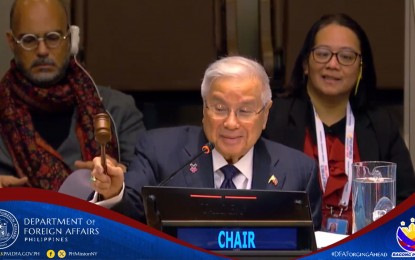
H.E. Antonio Lagdameo, Permanent Representative of the Republic of the Philippines to the United Nation. (DFA Photo)
MANILA – United Nations (UN) member states have pledged to boost financing and institutions to eradicate women’s and girls’ poverty.
This as the Philippine-chaired UN Commission on the Status of Women 68th Session (CSW68) concluded the March 11 to 22 session at the UN Secretariat in New York.
The annual conference was themed “Accelerating the achievement of gender equality and the empowerment of all women and girls by addressing poverty and strengthening institutions and financing with a gender perspective,” which cuts across all sectors and provides numerous avenues to push for the agenda for women's empowerment and gender equality.
UN Secretary-General António Guterres warned in his report to the Commission that worldwide, 10.3 percent of women live in extreme poverty, and progress towards ending poverty needs to be 26 times faster to achieve the Sustainable Development Goals by 2030.
To address this, the outcome document, or Agreed Conclusions, of CSW68 pointed out that women and girls living in poverty become “shock absorbers” in times of crisis, and that further efforts are needed to increase resources to address women’s and girls’ poverty.
Highlighting the need for international financial architecture to be suited for a crisis-prone world, the Commission called for reforms to enable countries to mobilize and invest resources in gender equality, such as debt relief, progressive taxation, and ensuring that public resources are allocated to address the needs and rights of women and girls.
The Agreed Conclusions also recommended mobilizing financial resources from public and private sources, strengthening the international financial architecture, ensuring a gender lens in national budgeting processes, and preventing regressive taxation that disproportionately impacts women and girls with low or no income.
Likewise, the outcome document noted that official development assistance must be increased to address women’s and girls’ poverty.
The share of total aid with gender equality as a policy objective decreased for the first time in a decade from 45 percent in 2019 to 43 percent in 2020, per the latest data of the Organisation for Economic Co-operation and Development, the Commission said.
The Commission also called for the implementation of gender-responsive economic and social policies, including increased women’s representation, leadership and participation in economic institutions, enforcing core labor standards to ensure equal pay for work of equal value, and implementing policies to support women-owned businesses.
Engaging and financing women’s organizations is also among the key recommendations.
“Robust, flexible and multi-year financing for locally led feminist movements and women’s rights organizations is critical to address poverty, as proven by existing mechanisms such as the UN Trust Fund to End Violence Against Women and the Women’s Peace and Humanitarian Fund,” the Commission emphasized.
The Agreed Conclusions called on member states to strengthen national capacities to collect and use disaggregated data on multidimensional poverty, and to adopt new development strategies towards sustainable economies.
These include strengthening inclusive and gender-responsive social protection systems and scaling up investment in the care economy to reduce women’s time and income poverty and expand their employment opportunities.
During the session, the Commission likewise adopted a resolution on HIV-AIDS (human immunodeficiency virus-Acquired immunodeficiency syndrome) led by the Southern Africa Development Community, which calls to increase investment in gender equality and the empowerment of all women and girls in the HIV-AIDS response.
Second highest attendance
The two-week session is the largest UN gathering on gender equality.
According to the Commission, CSW68 brought together world leaders -- including two heads of state, three vice presidents and over 100 ministers -- and 4,800 representatives of civil-society organizations, which is the second-highest attendance in CSW records.
The Philippines chaired the UN CSW68 through Antonio Lagdameo, Permanent Representative of the Philippines to the United Nations.
It was the first time the country chaired the Commission since 1995.
Among the participants from the Philippines are officials from the Philippine Commission on Women, Department of Foreign Affairs, Presidential Communications Office (PCO), Department of the Interior and Local Government, Department of Social Welfare and Development and civil society organizations.
Budget Secretary Amenah Pangandaman served as head of the Philippine delegation.
On the sidelines of CSW68, approximately 270 side events were organized by UN member states, intergovernmental organizations and UN entities; and more than 760 parallel events by civil society and youth-led organizations as part of the NGO CSW68 Forum.
Among the side events was the PCO-led “Going DigitALL: Women’s Empowerment through Digitalization” discussion on March 19.
CSW69 will take place on March 10 21, 2025, also in New York City. (PNA)
